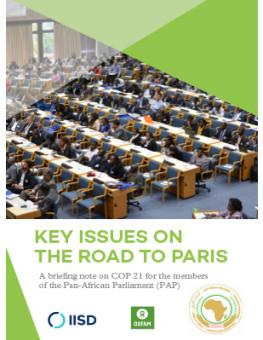
Key Issues on the Road to Paris: A briefing note on COP 21 for the members of the Pan-African Parliament (PAP)
The year 2015 is crucial in the fight against climate change.
From November 30 to December 11, representatives of 196 countries will meet in Paris to develop a new international climate change agreement. This meeting, the 21st session of the Conference of the Parties (COP 21) to the United Nations Framework Convention on Climate Change (UNFCCC), is particularly important because parties are expected to adopt an agreement that will lay the foundation for climate policy for decades to come. In advance of this conference, most countries have submitted targets for reducing or stabilizing their greenhouse gas (GHG) emissions towards the collective goal of limiting the increase in global average temperatures to 2°C above pre-industrial levels. Countries will also address issues of adaptation, loss and damage, financing, technology transfer and capacity building in developing countries.
This briefing note first offers a historical overview of understanding the climate change problem and putting in place a forum, the UNFCCC, to collectively address it. It then turns its focus towards providing a hands-on understanding of the means through which countries submitted GHG reduction and stabilization targets in 2015 ahead of the Paris Conference through their Intended Nationally Determined Contributions. It explores the various legal options suggested to the countries for the adoption of a Paris Agreement, before it addresses specific issues of adaptation, loss and damage, and climate finance. The note then briefly explores expected outcomes for COP 21.
L’année 2015 est cruciale pour la lutte contre les changements climatiques, alors qu’en décembre les représentants de 196 pays se réuniront à Paris dans le but d’adopter un nouvel accord international sur les changements climatiques. Cette rencontre, la 21e session de la Conférence des Parties (CdP 21) à la Convention-cadre des Nations unies sur les changements climatiques (CCNUCC) vise à adopter un accord qui posera les jalons des politiques climatiques pour les décennies à venir. En vue de cette conférence, la majorité des pays ont soumis des cibles de réduction ou de stabilisation de leurs émissions de gaz à effet de serre (GES), qui collectivement visent à limiter la hausse des températures mondiales moyennes à moins de 2 °C, comparativement aux niveaux préindustriels.
Cette note d’information débute par un aperçu historique de la compréhension des changements climatiques comme enjeu et la formation d’un forum, la CCNUCC, qui vise à le combattre collectivement. Les contributions prévues déterminées au niveau national (CPDN), outil à travers lequel les pays ont soumis au cours de l’année 2015 des cibles de réduction et de stabilisation de leurs émissions de GES sont ensuite abordées. Enfin, cette note aborde les formes juridiques d’un accord de Paris qui sont actuellement suggérées aux pays, avant d’analyser d’autres enjeux précis au cœurs des négociations climatiques tels que l’adaptation, la finance climat et les pertes et préjudices. Une brève analyse des résultats escomptés lors de la CdP 21 conclut cette note d’information.
Additional downloads
You might also be interested in
December 2024 | Carbon Minefields Oil and Gas Exploration Monitor
In November 2024, 23 oil and gas exploration licences were awarded across five countries, with Russia granting the licences that account for the largest portion of embodied emissions.
Increased Support Needed to Achieve India's Clean Energy Goals
India is on track to achieve many of its 2030 clean energy goals but needs to step up government support measures to accelerate the deployment of offshore wind, electric vehicles, and green hydrogen, according to a new report.
Budgeting for Net Zero
This study estimates the cost gap for battery energy storage systems (BESSs), offshore wind, solar photovoltaic (PV), electric vehicles (EVs), and green hydrogen (GH2) to inform government support.
Artisanal and Small-Scale Mining of Critical Minerals
This report examines the potential for artisanal and small-scale mining (ASM) to take an expanded role in the global supply of critical minerals.